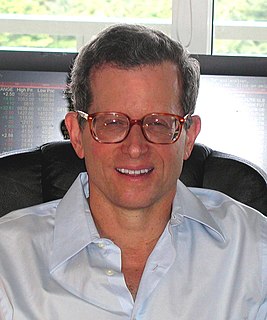Top 178 Quotes & Sayings by Famous Traders - Page 2
Explore popular quotes by famous traders.
In a narrow market, when prices are not getting anywhere to speak of but move within a narrow range, there is no sense in trying to anticipate what the next big movement is going to be. The thing to do is to watch the market, read the tape to determine the limits of the get nowhere prices, and make up your mind that you will not take an interest until the prices breaks through the limit in either direction.
If you invest and don't diversify, you're literally throwing out money. People don't realize that diversification is beneficial even if it reduces your return. Why? Because it reduces your risk even more. Therefore, if you diversify and then use margin to increase your leverage to a risk level equivalent to that of a nondiversified position, your return will probably be greater.
The truth is that once you get down on the trading floor, you find that the traders come from all walks of life. You don't have to be a rocket scientist to be a trader. In fact, some of the best traders whom I knew down on the floor were surf bums. Formal education didn't really seem to have much to do with a person's skill as a trader.
For instance, let us say that a new stock has been listed in the last two or three years and its high was 20, or any other figure, and that such a price was made two or three years ago. If something favorable happens in connection with the company, and the stock starts upward, usually it is safe play to buy the minute it touches a brand new high.
I have always played a lone hand. It is the way my mind works. I have to do my own seeing and my own thinking. But I can tell you that after the market began to go my way I felt for the first time in my life that I had allies - the strongest and truest in the world: underlying conditions. They were helping me with all their might.
It isn't a hunch but the subconscious mind, which is the creative mind, at work. That is the mind which makes artists do things without their knowing how they came to do them. Perhaps with me it was the cumulative effect of a lot of little things individually insignificant but collectively powerful.
Some of the best trades come when everyone gets very panicky. The crowd can often act very stupidly in the markets. You can picture price fluctuations around an equilibrium level as a rubber band being stretched -- if it gets pulled too far, eventually it will snap back. As a short-term trader, I try to wait until the rubber band is stretched to its extreme point.







